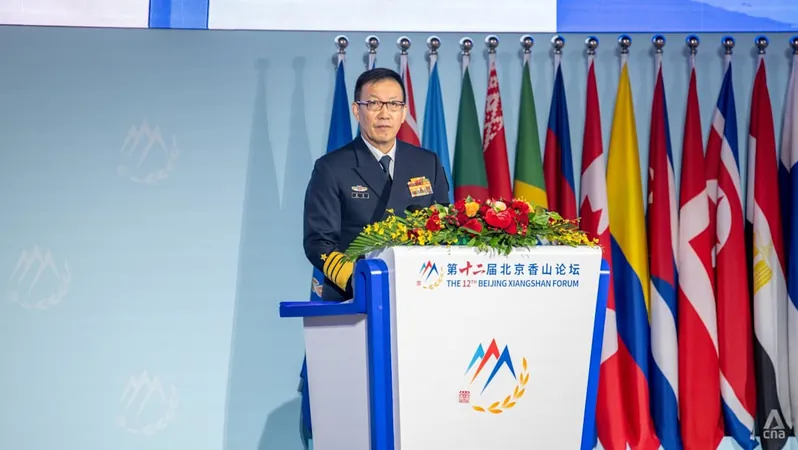
China's Defence Minister Champions Military Strength as a Path to Global Peace
2025-09-18
Author: Rajesh
China Makes Bold Claims on Military Power
In a striking address at the Xiangshan Forum in Beijing, China's Defence Minister, Dong Jun, declared that a robust Chinese military would serve as a decisive "force for peace" on the global stage. During his speech, he emphasized that the People’s Liberation Army (PLA) is committed to upholding the results of World War II while supporting all nations’ rights to defend their interests.
"As the PLA strengthens, so does our capability to deter conflict and foster world peace and development," Dong asserted, underscoring the military's role in global stability.
A Gathering of Global Leaders
The forum, which has gained prominence since its inception in 2006, is regarded as a major platform for international security conversations, paralleling events such as Singapore's Shangri-La Dialogue. With nearly 1,800 delegates from around 100 countries in attendance—including military officials and diplomats from nations like the U.S., Vietnam, and Russia—this year's discussions will delve into global security governance and regional peace-building.
Promoting Peace Through Dialogue
Dong reiterated that China’s military strategy is rooted deeply in peaceful development, actively opposing coercive military alliances and exclusive blocs. He advocated for a non-aligned approach and new security partnerships based on equality and mutual collaboration, emphasizing that conflicts should be resolved through dialogue rather than force.
Calls for Global Governance Reform
The minister underscored the need for reforming the global governance system to foster a more just international order. He referenced President Xi Jinping’s recent Global Governance Initiative, which aims to reshape the global landscape in response to modern challenges, echoing prior proposals including the Global Development Initiative and Global Security Initiative.
China as a Counterweight in Global Politics
Dong’s address highlighted China’s desire to position itself as a proponent of multipolarity, counterbalancing U.S.-led alliances amidst rising tensions in the region. He stated, "True multilateralism is essential, and it’s our goal to foster a cooperative multipolarity where all countries engage in managing global affairs collaboratively."
Taiwan: A Central Issue
Reiterating a long-standing position, Dong described Taiwan as "an inseparable part of China historically and legally," framing its reunification as essential to the post-war international order. He asserted that the PLA remains steadfast against any movements toward Taiwan independence, vowing to counter external interference.
Navigating Tensions in the South China Sea
With regards to the South China Sea, Dong pointed to collaborative efforts with regional nations to solidify conduct agreements and accelerate dialogues on a Code of Conduct, emphasizing China’s commitment to securing its territorial sovereignty in line with international law.
A Warning to External Influences
He criticized external forces that question China's maritime rights, arguing that such actions undermine established norms of international relations. Associate Professor Chong Ja Ian noted that Dong’s remarks carry an underlying message that regional issues should be prioritized by regional actors without interference from outside powers, a stance that may raise alarm among neighboring countries.
Conclusion: A Balanced Future?
While China pushes for a more influential role on the world stage through its military might, the implications of these statements may inflame security concerns among its neighbors, suggesting that the quest for peace might also lead to an escalation of regional tensions.



 Brasil (PT)
Brasil (PT)
 Canada (EN)
Canada (EN)
 Chile (ES)
Chile (ES)
 Česko (CS)
Česko (CS)
 대한민국 (KO)
대한민국 (KO)
 España (ES)
España (ES)
 France (FR)
France (FR)
 Hong Kong (EN)
Hong Kong (EN)
 Italia (IT)
Italia (IT)
 日本 (JA)
日本 (JA)
 Magyarország (HU)
Magyarország (HU)
 Norge (NO)
Norge (NO)
 Polska (PL)
Polska (PL)
 Schweiz (DE)
Schweiz (DE)
 Singapore (EN)
Singapore (EN)
 Sverige (SV)
Sverige (SV)
 Suomi (FI)
Suomi (FI)
 Türkiye (TR)
Türkiye (TR)
 الإمارات العربية المتحدة (AR)
الإمارات العربية المتحدة (AR)